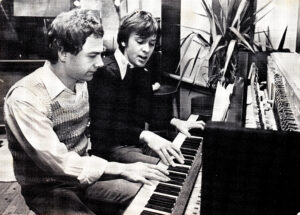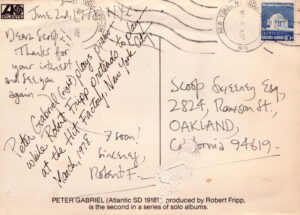使用Player FM应用程序离线!
Robert Fripp: The Art of Frippertronics
Manage episode 459658759 series 2292604
This time on the Plutopia podcast, we turn on our time machine and take you back to 1979. King Crimson guitarist and founder Robert Fripp was touring with his Frippertronics real-time tape looping device. He performed shows at UC Berkeley and Mabuhay Gardens, San Francisco’s premier punk venue. Following those shows, Ed Ward and Scoop Sweeney interviewed Robert Fripp and this restored from tape interview.
 Frippertronics, an innovative real-time tape looping technique, enabled Fripp to create layered, meditative soundscapes that defied conventional rock performance norms. The conversation explores Fripp’s unconventional approach to performance, emphasizing audience interaction and dismantling the typical performer-audience hierarchy. Fripp reflects on the economic and artistic challenges of touring, contrasting his intimate and improvisational Frippertronics shows with the larger, more commercial King Crimson tours. His insights into performance dynamics, audience influence, and the tension between art and commerce offer a unique perspective on the evolving nature of music and live performance.
Frippertronics, an innovative real-time tape looping technique, enabled Fripp to create layered, meditative soundscapes that defied conventional rock performance norms. The conversation explores Fripp’s unconventional approach to performance, emphasizing audience interaction and dismantling the typical performer-audience hierarchy. Fripp reflects on the economic and artistic challenges of touring, contrasting his intimate and improvisational Frippertronics shows with the larger, more commercial King Crimson tours. His insights into performance dynamics, audience influence, and the tension between art and commerce offer a unique perspective on the evolving nature of music and live performance.

Thank you note from Robert Fripp to Scoop.
Robert Fripp:
It’s ironic that this particular way of touring, if I were doing it on a purely financial level, really funny, we’re doing so much more money than King Crimson. Touring, I reckon, touring in a three-month form. I could earn as much as I earned from King Crimson, so I’m just saying. Touring with King Crimson took years. I think I earned $3,000, which was one tour in the spring in 1972, when it was known that the band was going to break out. So the booking agency didn’t take it seriously and bought this in a small venue. And I made $3,000, maybe two, two or $3,000 from that tour. That was the only time I ever made money from it. The statistics were, one, by the time the band finished July the first night, the average cost for us playing was $5,000 a night. That’s what it would cost. The average earnings were $5,000 a night. So over six years, with the exception of this one tour, I would have earned nothing. I could earn $3,000 probably in a week, here – I have minimal expenses.
Relevant Links
Featured photo by Jim Summaria. Creative Commons license: CC BY-SA 3.0
27集单集
Manage episode 459658759 series 2292604
This time on the Plutopia podcast, we turn on our time machine and take you back to 1979. King Crimson guitarist and founder Robert Fripp was touring with his Frippertronics real-time tape looping device. He performed shows at UC Berkeley and Mabuhay Gardens, San Francisco’s premier punk venue. Following those shows, Ed Ward and Scoop Sweeney interviewed Robert Fripp and this restored from tape interview.
 Frippertronics, an innovative real-time tape looping technique, enabled Fripp to create layered, meditative soundscapes that defied conventional rock performance norms. The conversation explores Fripp’s unconventional approach to performance, emphasizing audience interaction and dismantling the typical performer-audience hierarchy. Fripp reflects on the economic and artistic challenges of touring, contrasting his intimate and improvisational Frippertronics shows with the larger, more commercial King Crimson tours. His insights into performance dynamics, audience influence, and the tension between art and commerce offer a unique perspective on the evolving nature of music and live performance.
Frippertronics, an innovative real-time tape looping technique, enabled Fripp to create layered, meditative soundscapes that defied conventional rock performance norms. The conversation explores Fripp’s unconventional approach to performance, emphasizing audience interaction and dismantling the typical performer-audience hierarchy. Fripp reflects on the economic and artistic challenges of touring, contrasting his intimate and improvisational Frippertronics shows with the larger, more commercial King Crimson tours. His insights into performance dynamics, audience influence, and the tension between art and commerce offer a unique perspective on the evolving nature of music and live performance.

Thank you note from Robert Fripp to Scoop.
Robert Fripp:
It’s ironic that this particular way of touring, if I were doing it on a purely financial level, really funny, we’re doing so much more money than King Crimson. Touring, I reckon, touring in a three-month form. I could earn as much as I earned from King Crimson, so I’m just saying. Touring with King Crimson took years. I think I earned $3,000, which was one tour in the spring in 1972, when it was known that the band was going to break out. So the booking agency didn’t take it seriously and bought this in a small venue. And I made $3,000, maybe two, two or $3,000 from that tour. That was the only time I ever made money from it. The statistics were, one, by the time the band finished July the first night, the average cost for us playing was $5,000 a night. That’s what it would cost. The average earnings were $5,000 a night. So over six years, with the exception of this one tour, I would have earned nothing. I could earn $3,000 probably in a week, here – I have minimal expenses.
Relevant Links
Featured photo by Jim Summaria. Creative Commons license: CC BY-SA 3.0
27集单集
所有剧集
×欢迎使用Player FM
Player FM正在网上搜索高质量的播客,以便您现在享受。它是最好的播客应用程序,适用于安卓、iPhone和网络。注册以跨设备同步订阅。




